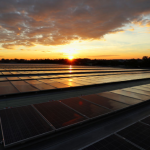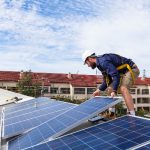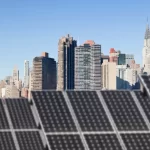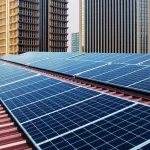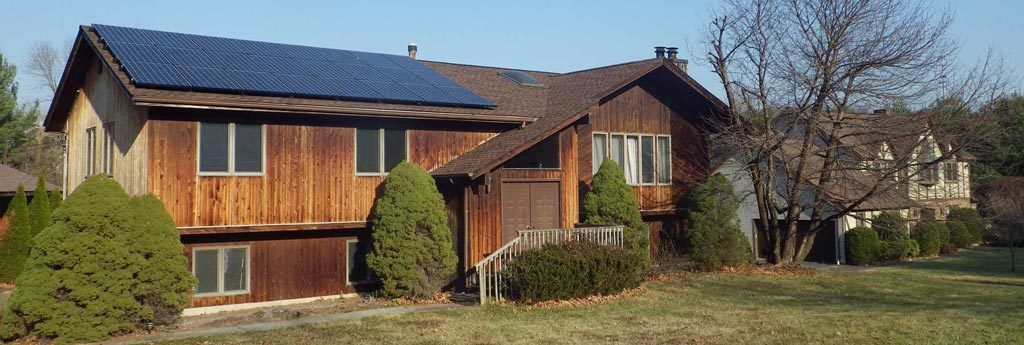
When the sun shines on the roof of your Rockland County home, it does little more than heat up your attic. Why not install solar panels and put this energy to good use? The popularity of solar energy in NY is growing, and you can be the next homeowner to make the switch. Here’s a look at the basics of solar energy so you can decide if it’s the right move for you.
What can I power with solar energy?
Solar panels convert sunlight into electricity. This means you can power anything in your home that you plug into the wall, from appliances and electronics to lights and your central air conditioner.
Some of your appliances may run on natural gas, such as the furnace and water heater, but by switching to electric models, you can power your entire home with solar panels. It’s an exciting prospect, especially as energy costs continue to rise.
What can I expect to save from switching to solar?
The amount of energy a solar array offsets is directly related to the number of panels you have. To help give you an idea, consider that a typical residential solar installation is a 5 kilowatt (kW) array consisting of about 25 solar panels. Based on the solar exposure in Rockland County, a 5kW system’s peak production is 550 to 600 kilowatt-hours (kWh) per month. For the average Rockland County home, this offsets about 70% of monthly electric bills.
Check the electricity usage on your past utility bills and see if your home uses this much energy each month. Because of air conditioning, your electricity use is likely to be higher in the summer. Fortunately, this heightened demand for electricity coincides with the season that solar panels perform at their peak thanks to ample sunny days and the sun’s high angle in the sky.
Does the weather affect solar panels?
As you might expect, sunny days are the best for peak solar panel performance, but electricity production still occurs on overcast days. After all, solar cells collect both visible and infrared light, so the rays that make it to the ground on cloudy days allow the panels to keep working.
Solar production decreases in the winter when the sun is at a lower angle in the sky, but cold sunny days are actually ideal for the production of solar energy in NY. The only time solar panels completely stop working is at night, when they’re in the shade and when they’re covered with snow. At all other times, you can expect your panels to work hard for you.
How efficient are solar panels?
There isn’t a straightforward answer to this question because different solar panel manufacturers produce products with different efficiency ratings. The two most important categories of solar panel efficiency are:
- Module efficiency: This is the solar panel’s ability to convert sunlight into usable energy. The highest rated panels on the industry today are manufactured by SunPower. They are about 21% efficient. This means when 1,000 watts of “peak sun” blast down on your roof, the panels generate about 200 watts of usable electricity.
- Area efficiency: This tells how much electricity a solar array can produce based on how large your roof is. SunPower panels produce about 325 watts per square foot compared to some lower quality panels that produce only 14 watts per square foot. High area efficiency means you can produce more electricity in a smaller space.
What solar incentives can I take advantage of?
The opportunity to offset a large portion of your energy bills is enticing, but you have the upfront cost to consider as well. Fortunately, federal and state tax incentives decrease the initial cost significantly. Be sure to take advantage of as many incentives as you can. They include:
- Federal tax credits: These cover 30% of the purchase and installation costs with no upper limit. You can claim this tax credit on installations completed through December 2016.
- State incentives: To encourage the expansion of solar energy in NY, the state offers a few lucrative incentives. First, you can apply for an income tax credit for 25% of the cost up to $5,000. Second, you are exempt from paying sales tax on the solar panel purchase. Third, you are exempt from a property tax increase for the next 15 years despite increased home value resulting from installing solar panels.
- Cash incentives: The New York State Energy Research and Development Authority (NYSERDA) offers incentives to qualifying residential and commercial solar installations. These are available on a first come, first served basis.
Now that you know the basics of solar energy in NY, you may be ready to pursue an installation. Work with an installer here in Rockland County to learn more and to get answers to any of your remaining questions.

